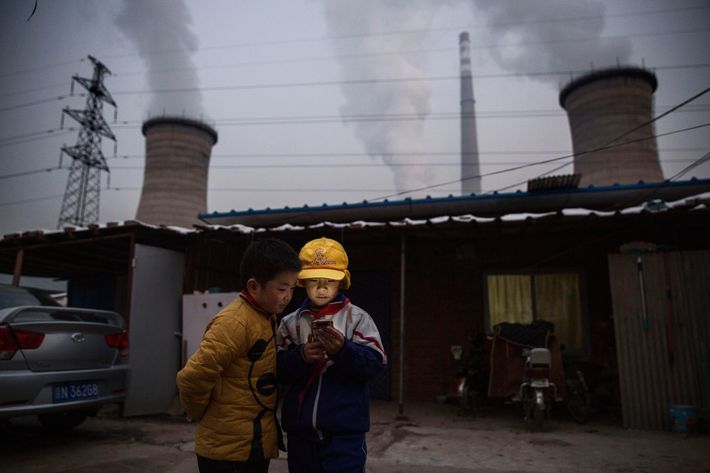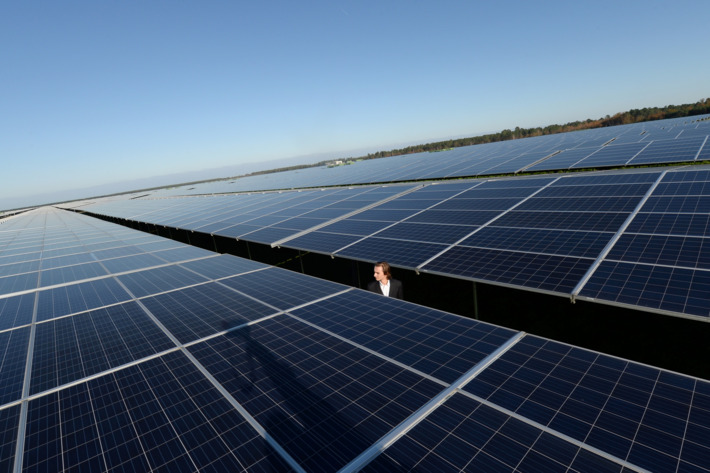
The climate accord reached by 195 countries in Paris on Saturday, which aims to halt global warming within this century, is being heralded by many world leaders, climate scientists, and news organizations as the turning point in the fight against human-induced climate change. The Guardian even went so far as to call the agreement the “end of the fossil fuel era,” as did activist leaders like May Boeve, the executive director of the environmentalist organization 350.org. In remarks celebrating the accord, President Obama said that the agreement was “the best chance we’ve had to save the one planet that we’ve got,” and that it showed “what’s possible when the world stands as one.” He also declared that the resulting deal “establishes the enduring framework the world needs to solve the climate crisis.”
However, many proponents of the plan agree that its value is more about symbolism and hoped-for gains than near-term substance, and critics are zooming in on the agreement’s lack of legal teeth, as well as how optimistic it seems to be about future international cooperation, technological advancement, and the sustained domestic will within each country. Much of the agreement was reportedly made deliberately vague so as to avoid hurdles like the Republican-controlled Senate. According to climate scientists, the voluntary emissions-reduction plans already fall far short of the agreement’s goal of keeping the world temperature less than 1.5 to 2 degrees Celsius above preindustrial levels by the year 2100.
After considering the strengths and weaknesses of the deal, Grist’s Ben Adler calls the accord “a big step forward” while also a “frustrating set of compromises and omissions”:
The COP21 conference brought every country to the table, they all accepted the science of climate change, and they agreed to work together to do something about it. But some proved more ambitious than others, and the rich countries didn’t come up with enough money to get the best deal possible.
The bottom line is that the agreement gets us far closer to containing climate change than we were two weeks ago, but still far short of where we need to go. In fact, we won’t even know for years what it will accomplish. How much the agreement reduces greenhouse gas emissions, and through that reduces warming, will depend on whether countries meet their targets for curbing emissions and deploying renewable energy and whether they ramp up their ambition in the years ahead. In terms of climate justice, there is even less to cheer. Rich countries like the U.S., Canada, and the European Union upped their pledges for climate finance slightly, but nowhere near enough to compensate for the hugely outsized share of the global carbon budget they have devoured.
But some climate scientists and activists are rejecting the agreement because they say it does not address greenhouse-gas emissions fast or far enough. Indeed, the most significant binding component of the agreement is that participating countries must eventually come together every five years to report and revamp their emission-cut targets, which they are left to voluntarily meet. Former NASA scientist James Hansen, who is widely considered the progenitor of climate-change awareness, isn’t buying any of it:
It’s a fraud really, a fake. It’s just bullshit for them to say: ‘We’ll have a 2C warming target and then try to do a little better every five years.’ It’s just worthless words. There is no action, just promises. As long as fossil fuels appear to be the cheapest fuels out there, they will continue to be burned.
Hansen maintains that any plan that doesn’t attach a fee to producing emissions towards an eventual carbon-free economy will fail to sufficiently address global warming. What the Paris agreement calls for, instead, is “net-zero” carbon emissions, which means that fossil fuels could still be burned, but that those emissions must be offset by decarbonization methods like like afforestation or carbon-capture technology (which is still a little more science-fiction than science.) Then again, as Greenpeace executive director Kumi Naidoo states, “There’s much in this deal that frustrates and disappoints me, but it still puts the fossil fuel industry squarely on the wrong side of history.”

Taking a constructive approach, environmentalist Bill McKibben acknowledges that “If you want to be cynical about the Paris agreement, there’s plenty of reason,” but he also insists that the fact that world governments have now made promises is an important development. In his mind, for those trying to get a meaningful foothold against global warming, the accord signifies the long-awaited beginning of a worldwide cooperative fight, particularly when it comes to holding world leaders accountable. “Game on,” McKibben crows:
This is a little like that moment when Barack Obama, upon winning the Democratic nomination in 2008, said that his administration would mark the moment “when the rise of the oceans began to slow.” He soon forgot about it, but the rest of us didn’t, and those words appeared on a thousand placards in the course of the fight over [the Keystone XL pipeline]. Which we won.
Now every world leader has said something similar. And even if we harbor suspicions that they didn’t quite mean those words, we will use them again and again. We’ll be the nagging parent/teacher/spouse. We’ll assume they really want action. And we’ll demand they provide it.
Put another way, by Vox’s Brad Plumer, “the Paris climate agreement hasn’t saved the planet and it hasn’t solved global warming,” but will instead “add structure and momentum to efforts that are currently underway around the world”:
Think of the countries making climate pledges as a bunch of out-of-shape slobs trying (and failing miserably) to qualify for a relay event. The Paris agreement can’t force these people to train harder. But it can put their names up on a whiteboard, track their progress, work out gym subsidies for those who can’t afford it, and facilitate peer pressure. Obviously the exercise is the crucial part, and that ultimately depends on each individual. But that other stuff can help.
But critics Walter Russell Mead and Jamie Horgan, writing in The American Interest, insist that “what came out of Paris was the diplomatic equivalent of a New Year’s resolution to go on a strict weight loss regime involving no more than six chocolate eclairs between meals.” Cynical about the international commitment, they call the accord a “manufactured success”:
Hypocrisy is the necessary lubricant of international life, and the Paris agreement is about as well lubricated as they come. Nobody is serious about this “agreement,” but the diplomats have agreed that a hollow facade of an agreement is preferable to the PR disaster that failure would have been. There will no doubt be many follow-ups, jet-setting conferences in many more attractive destinations, and climate diplomacy will continue to produce more greenhouse gasses than climate agreements block.
They instead believe that capitalism and innovation will play the central role in addressing climate change, rather than diplomacy. However, what if, as The Economist wonders, the diplomacy in Paris becomes an essential influencer for how the business sector plans for, and invests in, the future:
Perhaps the most significant effect of the Paris agreement in the next few years will be the signal it sends to investors: the united governments of the world say that the age of fossil fuels has started drawing to a close. That does not mean that they are necessarily right, nor that the closing will not be much more drawn out than the Marshall Islands and other such states would wish. But after Paris, the belief that governments are going to stay the course on their stated green strategies will feel a bit better founded — and the idea of investing in a coal mine will seem more risky.

According to reporting from the New York Times’ Coral Davenport, how the accord impacts global markets will likely be the key measure of its success, while the Conversation’s Clive Hamilton notes that such a shift is already well underway, as big business starts to run ahead of governments:
These corporations have not decided that principles should outweigh profits; they have decided that, looking over the next several years, sustaining profitability requires that they shift to low-emission energy. One factor weighing on corporate minds is exposure to risk in energy markets, which are likely to be more volatile and uncertain partly because of the growing challenge posed to fossil energy.
Central bankers are now anxious that a rapid, structural shift in energy markets and the destruction of asset-value in some of the world’s biggest companies may disrupt the global financial system.
Plus, as the Washington Post’s Chris Mooney adds, the deal also has a chance to make the world’s transition to clean energy more radical than gradual, which could be another bellwether for the agreement’s success. But speaking of economics, another hurdle the deal faces is if it overestimates the capability of the developing world to change, let alone whether or not the developed world will front the cash for that transformation. The Wall Street Journal’s Bill Spindle explains:
For developed countries, success will require not only actually reducing greenhouse-gas emissions starting very soon, but also channeling more than $100 billion annually to poorer, developing nations to help finance their efforts. Those poorer countries in turn will need to find ways to grow their economies and lift hundreds of millions of people into the modern middle class, while at the same time limiting and then ultimately slashing carbon emissions associated with fossil fuels that have driven such growth elsewhere for well over a century.
But complexities notwithstanding, to climate-change scholar Dr. Mat Hope, whether the summit and accord are all talk or not comes down to what the stakeholders do next:
The Paris deal creates the space for action. Policymakers must use that space to master a complex dance that decouples emissions from economic growth, stimulates a new type of consumerism, and weans society off the fuels it has depended on for centuries. If they use it to lie down and sleep, the world has a future no brighter than before.
And again, most proponents of the agreement acknowledge the long odds it faces, but are savoring the win regardless. Foreign Policy’s Neil Bhatiya tries to put the accord in context:
[T]his agreement, and the process behind it, was a statement of purpose by the international community: that amid a lot of divisions and seemingly intractable crises, nearly every country in the world could still come together, argue their interests, and, at the end of the day, put on paper a plan to save itself from an humanitarian and economic disaster.
The Paris agreement is not a perfect document, and it is by no means the last word on the subject. What it represents is the end of the beginning: the creation of an enabling document that puts the world on the right path forward.
Lastly, along those lines, The Atlantic’s Robinson Meyer considers how this one weekend in Paris, if the agreement plays out like he hopes, could be looked back on one day:
To my mind, climate is our great story. No other narrative envelopes all of humanity in quite the same way, forcing answers about the ethics of food, of oil, of technology, of economic security, of democratic republics and command capitalism, of colonialism and indigenous peoples, of who in the world is rich and who in the world is poor.
We live in the middle of history. Nations still bicker over borders, flaunt weapons of mass death, and abhor refugees in their midst. [Yesterday] they tried, miraculously and inadequately, to care for their common good.






























